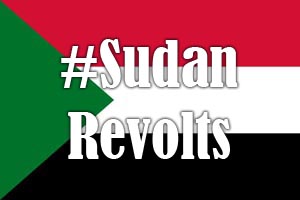 Must-read articles and tweets on #SudanRevolts:
Must-read articles and tweets on #SudanRevolts:
Protests sought to topple Sudan regime: Bashir – Yahoo
Sudan’s President Omar al-Bashir on Wednesday said deadly protests over fuel-price increases last month were part of an effort to topple his regime. “After we announced the latest economic measures they said this is a chance to overthrow Ingaz,” he said in a reference to his government which took power in a 1989 Islamist-backed coup. “They brought agents, thieves and hijackers, and they said Khartoum will be overthrown,” he said in eastern Sudan, without specifying exactly who “they” are. “But Khartoum could not be overthrown because it was guarded by God,” he said in a speech broadcast live on national radio. Bashir has previously spoken of “conspiracies” linked to the demonstrations and his Interior Minister Ibrahim Mahmoud Hamed claimed foreign links to “criminal” acts which allegedly occurred during the protests. On September 23 the government cut petrol subsidies, driving up pump prices by more than 60 percent and sending thousands into the streets to protest in the worst urban unrest of Bashir’s 24 years in power. Rights groups say around 200 people were killed by security forces…
Protesters Film as Sudan Revolts – Witness Blog
The Human Rights Channel is following events as they unfold in Sudan. Here we discuss a few videos from our ongoing playlist “Sudan Revolts.” In contrast to the uprising over austerity measures in Sudan last summer, the current protests are comprised of members from across diverse sectors of Sudanese society, and the government has responded more brutally than before. Activists counted 170 killed in the protests in the first week of the uprising. That week also saw a mass arrest of 800 people, a shutdown of the Internet, and redoubled repression of the news media. Civil society groups are calling on the African Union and the UN to investigate allegations of serious human rights violations. “The majority of deaths,” assert two Sudanese human rights organizations in a statement, “resulted from bullet wounds to the upper torso and head.” This video appears to corroborate documented use of live ammunition against protesters, though it leaves unanswered many questions about the circumstances of the man’s injury…
Making Sense of the Protests in Khartoum, by Alex de Waal
In the ten days following September 23, Sudanese cities witnessed the largest anti-government protests in many years. Many of the protesters aimed to bring down the government; others sought a reversal of its recent decision to reduce fuel subsidies. The police and security services responded with lethal force, and according to Amnesty International, killed more than 200 protesters. The ruling party played on the fear that, if the protesters should bring down the government, they would bring down the state as well. The protests have now since subsided.[1] This essay begins with the similarities between the September protests in Khartoum and other major Sudanese cities and popular uprisings against dictatorships in Sudanese modern history and in Arab countries in 2011—similarities that have led some to see this as heralding a “Sudanese spring” and the demise of President Omar al Bashir and the National Congress Party (NCP) government. I then turn to some important dissimilarities, including the weakness of the organizational structure of the protest movement, and the ways in which the armed opposition forces tend to negate the potential for non-violent civil uprisings. I briefly dwell on Sudan’s economic plight…
Qatar wades into the Sudanese revolt – Newstatesman
Sudanese President, Omar al-Bashir, has his back to the wall. The regime he has run for nearly a quarter of a century is facing its toughest test. Protests, which began after a doubling of energy prices, have been transformed into calls for the president to resign. Even the normally quiescent opposition parties have begun to support this demand. They have been joined by the mercurial Hassan al-Turabi, who once supported the President. Dozens of protesters have been killed by security forces loyal to the regime and as many as a thousand have been arrested. “The army is not involved, nor are the police,” an activist told the New Statesman. Ali – as he asked to be known – said the regular forces are drawn from and live with the community around Khartoum. They are not actively supporting al-Bashir. Instead the president is relying on the notorious Central Reserve Police, which is loyal only to the regime. “They come from the poorest Northern Sudanese villages, just like the President and his key adviser, Nafie Ali Nafie. The Central Reserve are well paid and serve the ruling National Islamic Front,” Ali said…
Trial of novelist Rania Mamoun delayed. 40 women staged a stand in front of court in Madani & gave head judge a memo pic.twitter.com/ZiN45KXwVO
— Girifna Media (@girifna) October 10, 2013









